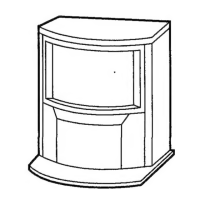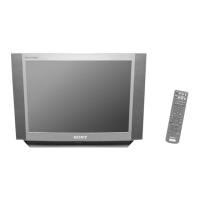Do you have a question about the Sony Trinitron KV-35S36 and is the answer not in the manual?
Identifies and explains the function of various buttons on the remote control for TV operation.
Provides essential safety warnings regarding electrical shock, fire hazards, and proper usage.
Offers advice on TV usage, cleaning, and installation to prevent damage and ensure safety.
Details FCC rules for digital devices and measures to correct radio frequency interference.
Expresses gratitude for the purchase and introduces the TV model series.
Outlines the four main sections of the manual and recommends reading order for TV operation.
Guides the user to check the model number on the TV for correct reference.
Describes common connector types used for setting up the TV and its components.
Explains how to connect the TV to cable TV systems or antennas for optimal picture quality.
Details connection methods for coaxial and twin lead cables to the TV's antenna input.
Covers simple connections directly from cable or antenna to the TV's VHF/UHF input.
Explains how to connect cable/antenna to the TV via a VCR for specific models.
Details connecting a cable box for scrambled signals and managing channel selection.
Guides connecting an antenna/cable TV system to a VCR and then to the TV for playback.
Details connecting an S-Video equipped VCR for higher picture quality, including audio and coaxial connections.
Illustrates connecting a VCR and cable box to the TV, including splitter usage.
Explains connecting an S-Video VCR with a cable box for improved video and audio signals.
Details connecting a DBS receiver directly to the TV for satellite signal reception.
Guides connecting a DBS receiver, VCR, and TV together for integrated satellite and recording functions.
Explains how to integrate a home stereo system with the TV for enhanced audio output.
Details connecting an AV receiver to the TV for advanced audio/video routing and control.
Guides connecting two VCRs to the TV's MONITOR OUT for tape editing and dubbing operations.
Explains the S-Link feature for seamless operation of Sony components, including auto input switching.
Details connecting a camcorder to the TV for direct viewing of recorded or live video.
Provides step-by-step instructions for attaching the glass door to the TV cabinet using provided hardware.
Guides the user through removing and installing the shelf supports and the shelf itself.
Instructs on correctly inserting AA batteries into the remote control, with important handling notes.
Explains how to navigate on-screen menus and select items using the remote's directional buttons.
Describes the on-screen help system available for navigating TV functions and menus.
Details how to adjust settings presented as sliders using the remote's select buttons.
Explains the EASY SETUP GUIDE feature for automatic channel scanning and language selection.
Provides tips for successful auto setup and instructions for manual channel selection via the SET UP menu.
Describes the AUTO PROGRAM process for scanning and storing receivable channels.
Details the primary functions of the remote control buttons for watching TV, like POWER, channel selection, and volume.
Explains how to set the sleep timer and cycle through display information like status and XDS.
Details how to switch between different video inputs (TV, Video 1, Video 2, etc.) using the TV/VIDEO button.
Describes the SYSTEM OFF function for powering down connected components and cycling through MTS sound options.
Explains how to display closed captions (Caption Vision) and text services using the remote and menu.
Explains the PIP feature, allowing simultaneous viewing of two channels, and its tuner requirements.
Details how to use specific remote buttons (PIP, TV/VIDEO, AUDIO) to control the window picture and sound in PIP mode.
Explains how to change the channel in the window picture and reposition it on the screen.
Describes freezing the window picture and swapping audio/video between main and window views.
Guides users on how to navigate and select options within the TV's on-screen menu system.
Details settings like CABLE, CHANNEL FIX, AUTO PROGRAM, and CHANNEL ERASE/ADD for channel management.
Explains how to set up channel captions for specific channels using the menu system.
Covers adjusting picture mode (STANDARD, MOVIE, SPORTS) and contrast/color settings.
Details adjustments for hue, color intensity, brightness, and sharpness for optimal picture quality.
Explains the Lightsensor feature and how to restore factory settings for the VIDEO menu.
Guides adjustments for treble, bass, and speaker balance for customized sound profiles.
Explains sound effects (SRS, SURROUND), MTS modes (STEREO, SAP, MONO), and speaker output options.
Details controlling audio output levels (VARIABLE, FIXED) for external audio systems.
Instructions for setting the current time and compensating for Daylight Saving Time.
Guides setting timers for automatic TV power on/off and channel selection.
Details channel setup options including CABLE, CHANNEL FIX, and AUTO PROGRAM.
Explains managing channels by erasing/adding and setting channel captions.
Describes how to block specific channels to prevent unauthorized viewing.
Guides setting up favorite channels for quick access and previewing.
Explains labeling video inputs and selecting menu language for user convenience.
Details how to correct picture tilt for specific models to ensure a level image.
Provides instructions and lists manufacturer codes to program the remote for VCRs and MDPs.
Lists VCR functions controllable by the remote, including power, playback, and recording.
Lists MDP functions controllable by the remote, including power, playback, and search.
Provides specific preset codes for VHS VCRs and 8mm VCRs for remote control compatibility.
Details programming the remote to control cable boxes using manufacturer codes.
Explains how to program the remote to control DBS receivers with specific manufacturer codes.
Addresses common problems like no picture, no sound, poor picture quality, and lack of color.
Provides solutions for issues like snow/noise on screen, dotted lines, and double images due to signal or interference.
Covers troubleshooting for inability to operate menus or select specific items.
Solves problems with receiving upper channels (UHF) or any channels when using cable TV.
Addresses remote control non-operation and malfunctions related to the S-Link connection.
Provides solutions for low volume with cable boxes and fixing the TV to a single channel.
Lists accessories included with the TV, such as remote controls and batteries.
Lists optional accessories like connecting cables and TV stands available for purchase.
Details power requirements, number of inputs/outputs, speaker output, and power consumption.
Provides physical dimensions, mass, television system, channel coverage, picture tube, screen size, and antenna connection details.












